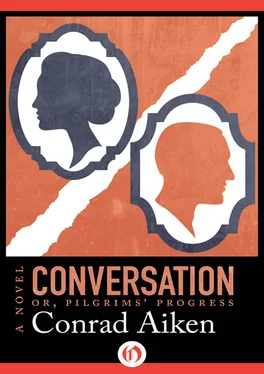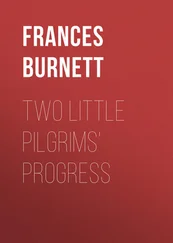The twirled doorbell rang harshly— zring, zring —at the front of the house. Just as he was entering the dining room, it rang savagely again. Blast it, what next? Couldn’t be Binney — the engine had stopped, and he must have gone. Retracing his steps through the hall and into the studio, he opened the front door into the gray, dripping street, and then stood staring. It was a taxi. A real honest-to-god yellow taxicab, complete with its little metal flag — standing there in front of the house, under the fog-drip from the poplars, in this defunct village, where no taxicab had ever been seen before. The driver was in the very act of clinking down the flag, and turning to the very odd-looking young man, pale and unshaven — or was it a little blond beard? — who was grinning and counting out a huge roll of bills. The black velours hat and the dirty blue flannel shirt were all too eloquent of his occupation. A cardboard suitcase stood on the gravel sidewalk.
“Twenty-eight, thirty. You said thirty, didn’t you, buddy? You know, I wouldn’t want to cheat you, after a miraculous expedition like that.”
“Thirty bucks is right. Say, where’s the nearest hotel from here, where I can get some grub?”
“Maybe this gentleman can tell you. I’m a stranger here. Is this Mr. Timothy Kane?”
“Yes. About a mile down the shore road, toward the Point — the Naushon. You can’t miss it.”
“Okay, thanks. And come again some time when you got nothing to do.”
“I’ll be seeing you!”
The young man, grinning and showing his bad teeth, dismissed the departing taxi with an effeminately wagged finger, looked after it with a sort of lascivious pride until it had turned the corner and gone out of sight, obviously pleased with his exploit — whatever it was — and then said: “All the way from Fall River, what do you think of that! Thirty iron-men worth of taxi! I suppose you never had a taxi here before? Did you?”
“No, I doubt it. It’s a little out of the beaten track.”
“The beaten track, eh? Ha ha. I guess you’re right. So this is Mr. Timothy Kane! Jim gave me your address here. My name’s Louis Bucholtz.”
“Glad to meet you. And what can I do for you?”
“Well, you see, I overslept on the boat. We had a party last night to see me off, so I missed the train at Fall River. Too bad! And no other connections for the Cape practically all day. I couldn’t wait all day in Fall River, could I? Fall River! My god. Have you ever seen Fall River? Have you ever seen the dump? Nothing doing. So, as I was Jim’s guest, so to speak, on a liberal allowance — the only thing I could do was take a taxi. Thirty bucks— boy , what a taxi ride. That driver was a nice feller, too. He enjoyed it. He said he’d never been out in the country before in his life. I guess he made a good thing out of it! Where’s Jim?”
“He lives up the road a little. I’ll show you.”
“You’ll forgive this spectacular intrusion, Mr. Kane? Jim told me the easiest way to find him would be to come to your house, as you were known here.”
“Sure. It’s only a couple of minutes’ walk. Come along.”
“Okay. So this is Jim’s little hideout — with trees and bushes and everything. Is that the sea? You know, I couldn’t believe it when he wrote me that he was going to live in the country. How do the girls like it?”
“Kitty and Lorna?”
“Yeah.”
“Not a hell of a lot. I get the impression they don’t take much to cooking.”
“Now, Mr. Kane, you wouldn’t kid me! Neither of them ever saw a stove before in her life, except maybe on the stage — or in a shop window — what do you expect! If you ask me, I think it’s a scream.”
“Yes, but you may not think it’s so damned funny when you don’t get any meals. I think Jim’s a little depressed.”
“Depressed! You’re killing me.”
“Are you a painter?”
“Me? No. I’m an artist. There’s a distinction. I write, and I paint, and I’ve done a little stage designing, and a little art criticism, but I haven’t decided yet what I’ll do. What’s the rush? I’ve got my ideas, but what can you do without a patron?”
“So that’s where Jim comes in. He’s a wonderful fellow.”
“That’s your opinion?”
“Isn’t it yours?”
“Are you being a little sly, Mr. Kane? A little oblique?”
“Not at all.”
“I get you. Yes, Jim’s all right.”
“There’s the house, down there — at the foot of the road. By the river.”
“House! My god! It’s a palace.”
“I’ve got to go back, but will you tell Jim for me that I’ll try to get over this afternoon?”
“Sure. Why not? Anything else?”
“That’s all.”
“Sure. And thanks for the good guidance!”
The ironic effeminate voice turned away, the shabby and spindling figure, with its shiny blue suit and cracked patent-leather shoes, sauntered down the road, looking as conspicuous as a crow at a garden party, and somehow sinister, though lacking the strength to be sinister. Good god, how could Jim be so completely blind? The creature might be amusing, but that he was a fake, a first-class typical Greenwich Village fake and poseur, there couldn’t be the smallest doubt in the world. And obviously sponging on Jim — as, of course, others had done before him — without even the redeeming virtue of believing in him. An artist! Nothing so simple and honest as a painter. Naturally. One of those artists who would scorn to learn such humble essentials as the rudiments of drawing and perspective, and dismiss them as old-fashioned. The short-cut, every time!
And that houseful of Jim’s, with this addition, and Kitty and Lorna not getting on with each other, and no food!
And now this little twirp riding all morning in a taxi, thirty dollars’ worth, at Jim’s expense, and then just smirking about it, as if it were all nothing but a joke — which in a way, of course, it was! — and already thinking of nothing but his little boast about it, the exploit which could be reported to his epicene friends in New York, on a postcard, or more likely by telegram! Regarding the country, too, as a mere subject for the obscene pleasantries of the cosmopolitan lounge lizards and lounge Lizzies of his dirty little cafés, his dives and ramshackle studios — good god, how sickening it was, if it wasn’t all somehow so dreadfully inevitable! Exactly what would, and must, happen to Jim — the just fate of the generous and misguidedly good. Damn!
He went in by the kitchen door, from the garden, not greeting Chattahoochee, who blinked up at him amber-eyed from under the dead plum tree. Enid went past him, ignoring him, carrying two plates up the steps to the dining room. The table, he saw, had already been set, and Buzzer, at her own table, was busy eating her lunch.
“I’m sorry,” he said. “I was interrupted.”
He sat down opposite her, and as she made no answer, merely frowned down at the potato salad which she was serving, he added, smiling: “By a visitor.”
She sat back in her chair, looked at him quickly and fully, dropping her hands in her lap.
“Yes,” she said, “I’m afraid I saw your visitor!”
“Oh. I suppose you looked out of the window. And what exactly do you mean by ‘afraid’?”
“I happened to be looking. I didn’t look.”
“And I suppose of course you listened?”
“I couldn’t very well help it, could I?”
“Well, just what do you mean by ‘ afraid’ ?”
“ Need you be so hypocritical?”
“Hypocritical!”
“You know quite well what I mean.”
“Do I?”
“I mean that this is the last straw. Absolutely the last straw. When it’s got to the point where our house is to be used as a convenience, and a sort of accommodation address for loathesome objects like that, and criminals, I draw the line. I’ve waited all morning for you to come to some decision of your own about this, Timothy. I’ve waited very patiently, but as you apparently prefer simply to evade your responsibilities I’ve had to come to a decision myself.”
Читать дальше












